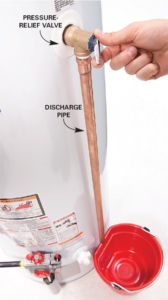What is a TPR Valve and why should I care?
By Robert Davis 1/3/2020
All water heaters are required to have what is called a Temperature & Pressure-Relief Valve, also known as a TPR valve. A TPR valve prevents your water heater from Exploding!! That’s right, your water heater has the potential to explode in your house. When water is heated to 212 degrees Fahrenheit it will boil, vaporize and expand 1700 times its original size. Without a relief valve, this pressure will rupture the water heater tank and KA BOOM! It will take off like a rocket in your house, destroying anything in its path. In the early 20th century this was actually a major concern because pressure relief valves were not integrated into water heater design.
However, modern water heaters are designed with safety features and can withstand years of normal household use. The valve you see on the side (and sometimes on the top) of your water heater is the TPR valve. It is engineered to open if is senses pressure over 150 psi or if the temperature in the tank exceeds 210 degrees Fahrenheit. It prevents a catastrophic tank explosions.

Even though modern water heaters are designed to be relatively maintenance free, It is important to check the condition of your TPR valve annually. Check the connection between the TPR valve and the tank for corrosion. This could indicate leaking at the tank. Check that the valve itself is not leaking. This could indicate the valve is stuck open. Also, check that the TPR valve has an extension pipe and that the pipe extends to within 6 inches of the ground. This pipe serves to direct the flow of water if the valve were to open. Additionally, this pipe must be the same diameter as the TPR outlet and may not restrict the flow of water in any way. This means that the pipe must always point downwards and it may NOT have a shut off valve. Without this pipe, you could be burned by 210 degree pressurized water in the event the valve were to open. Checking your TPR valve annually will ensure that your water heater is safe for years to come. Finally, if you are concerned about the condition of any aspect of your water heater, contact a plumber for further evaluation and to correct any issues.
As always, thank you for your time, like and share us on Facebook, Instagram, and Youtube, and check us out at hometowninspect.com. Have a great day.
Signed,
Robert Davis
Hometown Inspections





